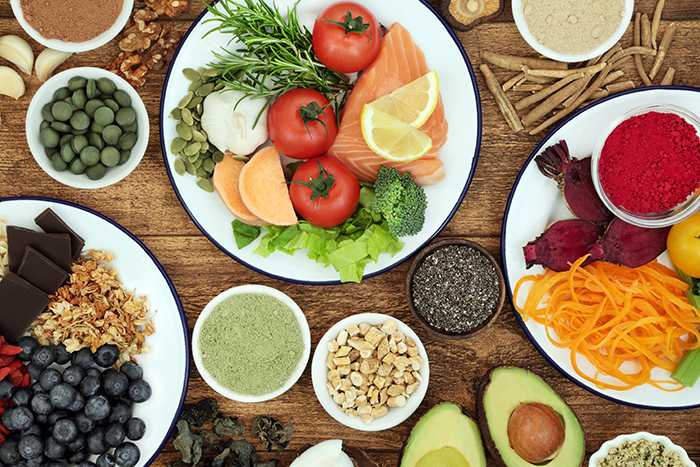Currently, Alzheimer’s disease (the most common cause of dementia) and mild cognitive impairment affect more than six million people in the US. Contrary to popular belief, memory disorders are not an inevitable part of aging. In fact, a number of research studies are showing that certain nutrients may help protect against a decline in cognitive function. Below are four nutrients that may help prevent memory loss.
1. Phosphatidylserine
Phosphatidylserine is a phospholipid (fatty substance) found in high concentrations in brain tissue – it can make up as much as 15 percent of the human cerebral cortex (the outer nerve tissue layer of the brain). Phosphatidylserine is important because it forms part of the cell membranes covering and protecting the brain’s cells, and helps carry messages between brain cells.
Phosphatidylserine supports numerous functions related to memory, such as:
-The ability to create new memories
-The ability to retrieve memories
-The formation of short-term memories
-The consolidation of long-term memories
-The ability to learn and recall information
How to incorporate phosphatidylserine into your diet: Phosphatidylserine is found naturally in certain foods, like soybean, egg yolks, and chicken and beef liver. It can be taken as a supplement but should be done so under the care of a physician or licensed practitioner, as it can react negatively with other medications like antihistamines and antidepressants.
2. Choline
Choline is an essential nutrient for normal bodily function and health. It is the precursor to various substances found in the body, like acetylcholine (an important neurotransmitter). One study shows that increasing choline intake earlier in life may protect the brain from cognitive impairment and certain types of dementia, like Alzheimer’s disease, later in life. The body produces a small amount of choline, but needs supplemental amounts from food.
How to incorporate choline into your diet: Choline is found in many foods, including eggs, peanuts, spinach, salmon, and beets.
3. Boron
Boron is a trace mineral that is an essential part of the body’s metabolic processes. Although the body doesn’t need much of it, boron is vital for human life. Boron wasn’t always recognized as an essential nutrient, but scientists had recognized its effect on cognitive function. A recent study shows that decreased levels of boron lead to poor performance in attention and short-term memory tasks. The body does not produce boron and must receive its daily intake from food.
How to incorporate boron into your diet: Boron can be found in plant-based foods, like avocado, red kidney beans, lentils, prunes, and various other foods.
4. Magnesium
Magnesium is a mineral that supports plasticity in the brain (the ability of the brain to form new connections and the foundation of memory and learning). Deficiencies in magnesium have been associated with memory conditions, like Alzheimer’s disease. Furthermore, one study showed that by increasing levels of a specific magnesium compound, called magnesium-L-threonate, in mice, scientists were able to enhance working memory and short and long-term memory.
How to incorporate magnesium into your diet: Magnesium is found in a wide range of nuts and seeds, including pumpkin seeds almonds, cashews, and peanuts. It can also be found in other foods, like spinach, black beans, and dark chocolate.
Not Sure Where to Start? Ask Your Pharmacist, or Consider Working With a Licensed Nutrition Educator
If you’re looking for ways to incorporate more brain-boosting nutrients into your diet, you can contact us online, or by calling (866) 872.5430, to receive a Nutrition Consult from our Pharmacist/Nutrition Educator here at Summit Health Pharmacy. You may also wish to consider working with a registered dietitian nutritionist (RDN), Nutrition Educator, or Anti-Aging Specialist. Your nutrient needs depend on your age and gender. These nutrition experts will work with you to help create a well-balanced diet plan that includes essential nutrients for healthy brain function.
Resources:
https://www.ncbi.nlm.nih.gov/pmc/articles/PMC4258547/
https://www.ncbi.nlm.nih.gov/pubmed/25933483
https://www.livestrong.com/article/289824-foods-that-contain-phosphatidylserine/
https://www.rxlist.com/phosphatidylserine/supplements.htm#Interactions
https://www.ncbi.nlm.nih.gov/pmc/articles/PMC5579609/
https://academic.oup.com/ajcn/article/94/6/1584/4598197
https://lpi.oregonstate.edu/mic/other-nutrients/choline#food-sources
https://www.ncbi.nlm.nih.gov/pmc/articles/PMC1566632/
https://www.ncbi.nlm.nih.gov/pmc/articles/PMC4712861/
https://www.ncbi.nlm.nih.gov/pmc/articles/PMC4712861/table/t1-35-48/
https://www.ncbi.nlm.nih.gov/pubmed/20152124
https://www.ncbi.nlm.nih.gov/pubmed/17046669
https://www.ncbi.nlm.nih.gov/pmc/articles/PMC6024559/
https://www.ncbi.nlm.nih.gov/pubmed/20152124
https://my.clevelandclinic.org/health/articles/15650-magnesium-rich-food
https://www.eatrightpro.org/about-us/what-is-an-rdn-and-dtr/what-is-a-registered-dietitian-nutritionist



